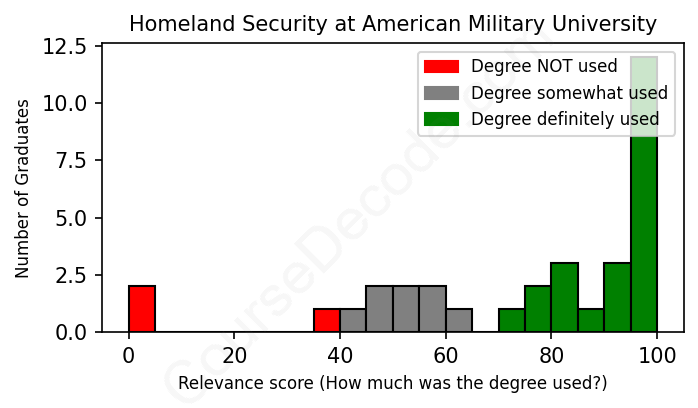
First, some facts. Of the Homeland Security graduates from American Military University we've analyzed , here's how many have used (or NOT used) their degree in their career:

These are estimates based on AI analysis of 33 LinkedIn profiles (see below).
The verdict? Above average. Overall, with an average relevance score of 74%, Homeland Security graduates from American Military University have a higher likelihood (+7%) of finding work in this field compared to the average graduate across all fields:
And for comparison, here's the chart for all profiles we've looked at across all degrees.
Also, after graduating, 36% of these graduates have pursued further education other than another Bachelor's degree (such as a Masters degree or other), compared to the average across all profiles of 35%. This suggests you may need more than just a Bachelors degree to be competitive as a Homeland Security graduate.
See the details:
|
Relevance score: 100% We think this person has gone into a career highly relevant to their degree. We think this person has gone into a career highly relevant to their degree.
DEGREE INFOGraduated in 2021 from American Military University with a Bachelor's degree in Homeland Security. Also pursued further education since (see below). JOB HISTORY SINCE GRADUATIONArmy Reserve Career Counselor 4th Bn ARCG Jul 2022 - Present FURTHER DEGREES DONE SINCE GRADUATINGAssociate of Science - ASSonoran Desert Institute 2022 - 2024 ABOUTI will try to make this somewhat brief. I have had quite a few different jobs and have done quite a few interesting things between the military and civilian life. Right out of high school I joined the Iowa Army National Guard. I spent 12 years with the IANG, got certified in repair of two airframes, the CH-47 Chinook and the UH-60 Blackhawk. Was a crewchief on the UH-60 for several years then became a Standardization Instructor for the last three years in aviation. I completed two deployments in that time with C Co. 2-211th GSAB (Medevac), providing medecal evacuation to regions in Iraq and Afghanistan. During this time when I wasn't doing military duties I used my Automotive educations from North Iowa Area Community College, and worked in several shops and dealerships in the North Iowa area. After Afghanistan I left aviation to become a Senior Cadre and Basic Instructor for B Co. RSP, and got to train newly signed warriors on basic tasks before they went to basic training. ETS from the IANG came December of 2015, but in August of 2016 I found a new home in the Army Reserves. I became a member of the 407th CA BN, and March 2016 I became a member of the Civil Affairs Branch. This change also made me seek out further education, so I started taking classes through American Military University to achieve a Bachelors in Homeland Security. Recently deployed with B Co 407th CA BN as a CA Team Sergeant, in charge of team operations planning, evaluation, and information input and analysis. |
The top 10 most common jobs done by the graduates we've analyzed (ranked most common to least) are:
From analyzing the career paths of individuals who graduated with a degree in Homeland Security from American Military University, it seems like the most common jobs these folks have landed fall within the military or federal agency realm. Many of them have pursued roles in operations, logistics, and emergency management, which heavily align with the principles taught in their degree program. Positions such as Operations Sergeant, Security Operations Officer, and various management roles within military units are prevalent. Additionally, roles at agencies like the Federal Bureau of Prisons or various departments within the Department of Homeland Security also show a clear connection to the technical knowledge these graduates acquired while studying.
While many of these jobs are indeed relevant to Homeland Security, there are also some positions that diverge from the core competencies of the degree. Jobs like Project Manager or roles in sales, while potentially utilizing some skills related to risk management or compliance, don't fully leverage the specialized knowledge in security and crisis management. Overall, a significant portion of the careers appear to be directly tied to Homeland Security principles; however, a notable number of roles highlight a broader application of skills that aren't strictly limited to this field. So, while you can see a direct line connecting education and employment for many of these graduates, not every path aligns perfectly with what they studied.
Here is a visual representation of the most common words in job titles for Homeland Security graduates (this is across all Homeland Security graduates we've analyzed, not just those who went to American Military University):

Graduates from the Homeland Security program at American Military University typically follow a career path heavily influenced by their military backgrounds and the nature of Homeland Security work. For many of these individuals, the first jobs after graduation often involve roles within military operations or federal agencies, such as logistics and operations positions in the Army or roles in the Federal Bureau of Prisons. It's not unusual to see them quickly progressing into supervisory or specialized roles within the military or government, suggesting that their education gives them a competitive edge in these sectors. Over the years—say, five to ten after graduation—it looks like a lot of them move into high-level positions, often maintaining ties with the military or transitioning to roles in logistics, emergency management, or security.
While some alumni have taken different career paths that veer into the private sector or even unrelated fields, the overall trend shows a strong alignment with Homeland Security disciplines. Many have solid careers that leverage their degree directly, working for government agencies or companies that focus on security and emergency management. However, others have pursued entirely different careers, reflecting a mix of success and divergence from their initial Homeland Security focus. Overall, it appears that while most graduates find relevant opportunities, some may struggle to connect their degree directly to their job roles in the longer term.
Honestly, a Bachelor’s degree in Homeland Security, whether at American Military University or elsewhere, tends to be on the more manageable side compared to some other degree programs. It covers a lot of practical topics like emergency management, cybersecurity, and law enforcement, which can be interesting and relatable for students. The coursework usually involves a mix of reading, writing, and some group projects, but it’s not typically loaded with complex math or hard sciences, making it less daunting for many. If you're organized and willing to engage with the material, you’ll likely find it a pretty doable degree. However, it still requires commitment and effort—so, while it might not be the hardest degree out there, it's definitely not a walk in the park either!
Most commonly, in the LinkedIn profiles we've looked at, it takes people 3 years to finish a Bachelor degree in Homeland Security.
Based on the LinkedIn profiles you shared, it looks like these Homeland Security graduates from American Military University generally have solid career paths ahead of them, especially within government and military roles where salaries can be quite competitive and often come with great benefits. Many of them started with various operational and leadership roles in the Army, which can lead to decent pay and job stability. Some have transitioned into private sector jobs or specialized government positions that typically pay well, like logistics and project management at significant organizations. Of course, entry-level positions, like those in the federal prison system or military, might not be raking in the big bucks right off the bat, but as they gain experience and move up in rank, their earnings likely improve significantly. Overall, it seems like they've set themselves up for decent earnings, especially in the long run!
Here is a visual representation of the most common words seen in the "about" section of LinkedIn profiles who have a Bachelor degree in Homeland Security (this is across all Homeland Security graduates we've analyzed, not just those who went to American Military University). This may or may not be useful:

Here are all colleges offering a Bachelor degree in Homeland Security (ordered by the average relevance score of their Homeland Security graduates, best to worst) where we have analyzed at least 10 of their graduates:
| College | Score | Count |
|---|---|---|
 American Military University American Military University
|
74 | 33 |
 Embry-Riddle Aeronautical University Embry-Riddle Aeronautical University
|
66 | 11 |